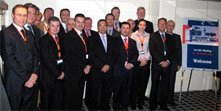 UNICRI,
UNICRI,
26 October 2007. Safety and security during major events were the
keywords of the meeting that took place on the 25th and 26th of October
at The Hague (the Netherlands), hosted by the Dutch Ministry of
Justice.
The organization of large events can represent a major concern for
countries. Despite the fact that Major Events often uphold principles
of freedom and peace, their safety and security are undermined by many
threats. Above all, a major event can be seen by terrorists as an
opportunity to intimidate the population or to influence government
policy. The recent alleged Al Qaida plot to bomb a Premiership football
game LIVE on British TV is a confirmation of this potential threat.
The meeting that took place in The Hague was organized in the
framework of the project “Coordinating National Research Programmes on
Security during Major Events in Europe” (EU-SEC).
In 2004, ten EU Member States and EUROPOL, coordinated by the United
Nations Interregional Crime and Justice Research Institute (UNICRI),
gathered the comprehensive Consortium of the EU-SEC project. The
project is funded by the European Commission.
Based on the assumption that Major Events benefit a lot from
international cooperation and their legacy is of outstanding importance
to the best security planning across Europe, EU-SEC is devoted to the
coordination of the existing national research programmes in the field
of security at Major Events. It is testimony to the commitment of the
United Nations to the regional dimension of the European Union and its
intention to contribute to the configuration of an effective European
Research Area in the field of security during Major Events.
Final beneficiaries of the projects are national authorities in
charge of planning security and organizing big international and
national sports meetings such as the Olympic Games or the football
World Cup, important commemoration ceremonies, large religious or
political meetings and political demonstrations.
After three years of activities, the EU-SEC Consortium was in the
position to launch its first joint action: a call for ideas which
applies a consolidated methodology to particularly innovative topics.
It aims to identify the best ideas and expertise from European public
and private laboratories to develop two electronic tools.
The Specialist Technical Equipment Pool (STEP), open to and filled
by security planners, will facilitate the effective exchange and
updated awareness of the technical resources available in the EU area.
The European Major Events Register (EMER), by giving major events
national recognition of European status, will improve the immediate
levels of international cooperation and assistance among countries.
Moreover, these initiatives will also entail benefits for the European security technology market.
According to the Director of UNICRI, Mr. Sandro Calvani, “The
results so far achieved through the EU-SEC project prove the strong
cohesion within the European Union in identifying and sharing common
instruments to protect citizens during Major Events. The call for ideas
launched today will maximize further the benefits of international
cooperation in this field”.
The text of the call for ideas, including more information about its
scope and methodology is available on the website of the EU-SEC project
(www.eu-sec.org). The deadline for responding to it is 26th of November 2007 at 13.00 CET.
Contingent on the success of EU-SEC, EU-SEC II aims to widen its
scope with an enlarged consortium of 24 EU Member States. The principal
aim of EU-SEC II is to coordinate national research programmes and
policies in the field of security at Major Events, with a view to
harmonizing the common research needs and priorities of the partners of
its Consortium. Moreover, the project will concretely contribute to the
elaboration of a strategic research roadmap to orientate the European
research agenda and the related allocation of funds.
During the meeting of the 26th of October, UNICRI also presented the
IPO Security Planning Model – a unique instrument to be used to assist
national authorities to aid the planning and implementation of security
at Major Events. Additionally, the planning model highlights the
strategies, questions, linkages and other challenges that security
planners should take into account. The document is grounded in
international experience and best practices gathered and collated by
the UNICRI International Permanent Observatory (IPO) while assisting
and cooperating with several countries in the planning of security
during Major Events.
Finally, UNICRI presented innovative research into intelligence
sharing and cooperation in the European Union to combat terrorism,
elaborated within the framework of the European Foreign and Security
Policy Studies (EFSPS) funded by the Compagnia di San Paolo,
Riksbankens Jubileumsfond, and VolkswagenStiftung. Recognising that the
transnational nature of contemporary terrorism makes it a threat common
to all EU Member States, the research offers a critical analysis of
existing European structures and policies for intelligence sharing, and
gives multiple recommendations for the improvement of information flows
among States.
Quelle: http://www.unicri-ipo.org
